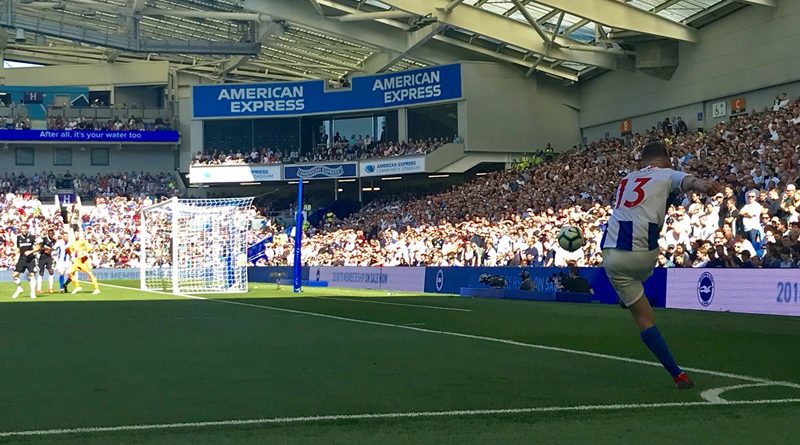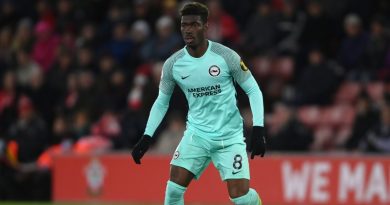How playing behind closed doors could affect Brighton’s survival chances
As the coronavirus pandemic shows little sign of slowing in the United Kingdom, the prospect of finishing the Premier League season behind closed doors or in neutral venues is apparently becoming a very real possibility – but what would this mean for the survival hopes of Brighton & Hove Albion?
Typically given this is the Premier League, money and image are setting the arguments for getting the 2019-20 season done by hook or by crook.
The main justification towards playing behind closed doors seems to be that clubs are worried they may not receive their share of broadcast revenue should the season not be completed by the start of July.
People may be dying of an uncontrollable virus, but the Premier League would rather expose club employees to the prospect of contracting Covid-19 than miss out on their bounty. At the same time as dragging ambulances and police away from more pressing issues to work on match days at stadiums.
The reasons against are largely to do with the image of the league. We’re constantly told that one of the reasons the Premier League is so popular is because of the atmosphere inside grounds.
Paul Barber raised this in a recent interview with The Argus, saying, “My concern is it is not the product we promise, it’s not what Sky are used to, it’s not what the fans are used to or the players are used to.”
Playing out the remaining nine games of the 2019-20 campaign to a backdrop of empty seats could devalue the product.
As a result, there has even been some ridiculous talk of opening stadiums, but testing every attendee for coronavirus before they enter – because that is where we need testing kits to be used rather than on front line NHS staff battling to save lives every day.
Incredibly, nobody seems to be talking about what playing behind closed doors or at neutral venues because of coronavirus could do to the sporting integrity of the competition – especially if you are a club with a home run-in like Brighton.
Modern day stadiums and a flattening of atmospheres may mean that home advantage is not as big as it once was, but it can still help to level the playing field a little when the smaller clubs take on the big boys.
Take Brighton’s two-and-a-half seasons in the Premier League so far. In that time, the Albion have won 24 games. 17 of those victories have been at home.
Supporters may point to a disappointing record of seven away wins and say it’s largely down to Chris Hughton and his negative tactics on the road.
And while they might have a point, Graham Potter has only won two away games as Brighton boss – proof that it doesn’t matter how you approach games, picking up victories when you don’t have home advantage in the Premier League is difficult.
In the 2017-18 season, the Albion only lost one game at the Amex to opponents who didn’t finish in the top five – Leicester City.
Last season, we beat Manchester United at home, drew with Arsenal and should have had a point from Liverpool had Mo Salah not conned yet another referee with his Tom Daley diving act. Results that were vital to survival.
Results like those show why home advantage is so important. Look at the Albion’s record against United. Twice we’ve played them at the Amex in front of 30,000 Brighton supporters and twice we’ve beaten them – and been good value for it.
Four times we’ve got to Old Trafford in front of 78,000 United fans and four times we’ve lost. Playing in front of an empty stadium or at a neutral venue such as Wembley or St George’s Park takes away home advantage.
Just before the Premier League season was suspended, Watford pulled off one of the shocks of the campaign by beating Liverpool 3-0 at Vicarage Road.
Does anybody who hasn’t decided to take up crystal meth in their spare time during lockdown think that would have been the result had the game taken place at Anfield?
If Brighton had a final set of home fixtures that read Norwich City, Aston Villa, Watford and Bournemouth, you could argue that playing behind closed doors or at a neutral venue because of coronavirus wouldn’t have mattered as much.
They are all opponents that we should reasonably be expecting to beat home and away. And yes, we know that we’ve already failed to beat Bournemouth and Watford once and Villa twice.
The Albion’s Amex run-in of Arsenal, United, Liverpool and Manchester City looked tough enough as it was. But at least we would have home advantage for it; the bigger and better the opponents, the more important that can be.
Watford had the chance to play – and beat – Liverpool in front of their own fans. Norwich did the same to City at Carrow Road. If the season is played out behind closed doors at neutral venues because of coronavirus, Brighton won’t have those same opportunities.
Take home advantage away and a fixture becomes less skewed; it is logical to assume that ability will be a greater factor in deciding it than because one of the teams in question is playing in unfamiliar surroundings in front of an intimidating crowd.
Which is where Brighton could be buggered. With a rocking Amex and a team who don’t fancy their day by the seaside – see United in the past two seasons – there was still a hope that we might sneak some unexpected points from one of the big six between now and the end of the season.
Play those games in neutral venues with no crowd and suddenly, that hope disappears. Only West Ham United have a run in as tough as ours.
If the sides below us in the table are able to pick up points against opponents of similar ability where home advantage may not have been such a leveller, suddenly we could be in trouble.
Obviously, there are hundreds of reasons why finishing the Premier League season behind closed doors or in neutral stadiums is a terrible idea. Chiefly because hundreds of people are still dying every day from coronavirus.
The league seem determined to get the campaign finished sooner rather than later though. Money is of course the overwhelming consideration, but if the powers that be truly care about the competition, then sporting integrity should come into the decision making.
And you can’t have a fair and just competition if clubs are suddenly surrendering home advantage for crucial matches just so Sky and BT Sports hand over millions of pounds.
Which just adds to the argument of waiting for all this to be over and restarting the season when it is safe to do so. In front of full houses, the way football should be played.




